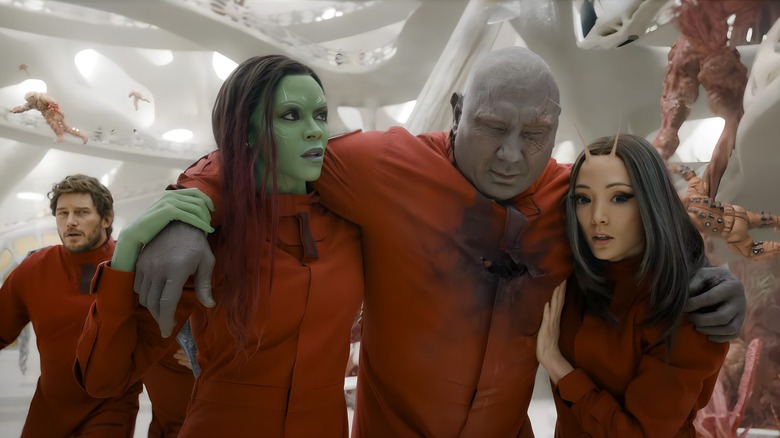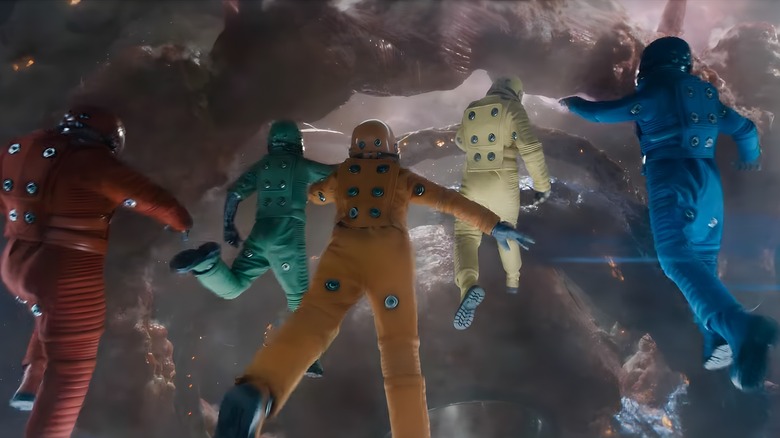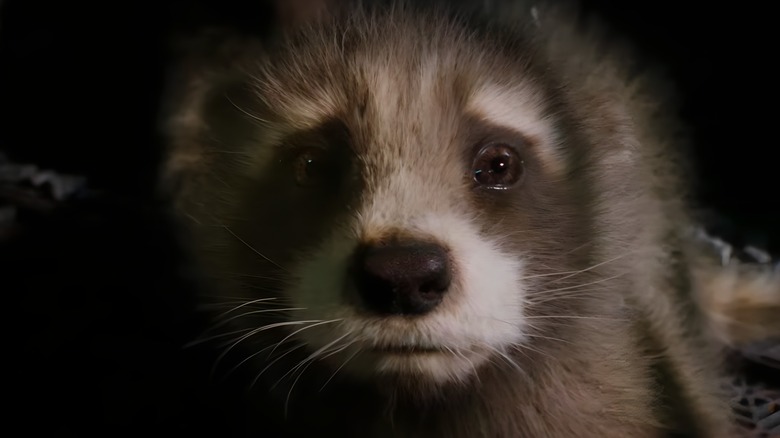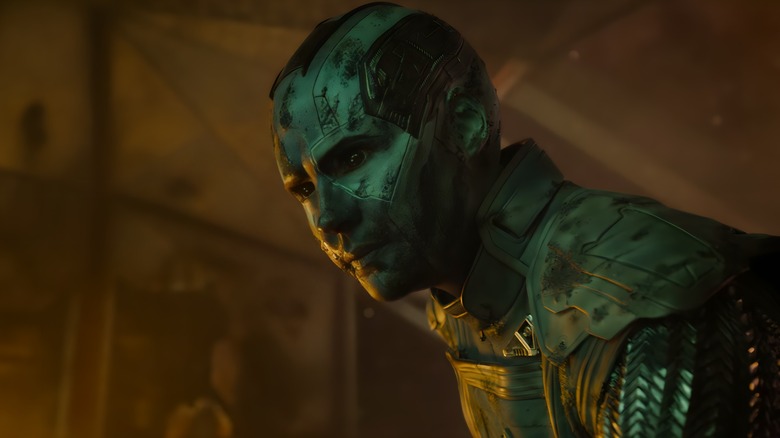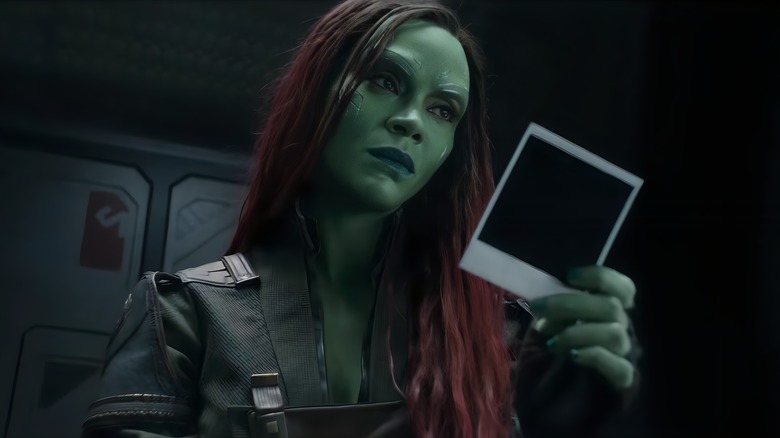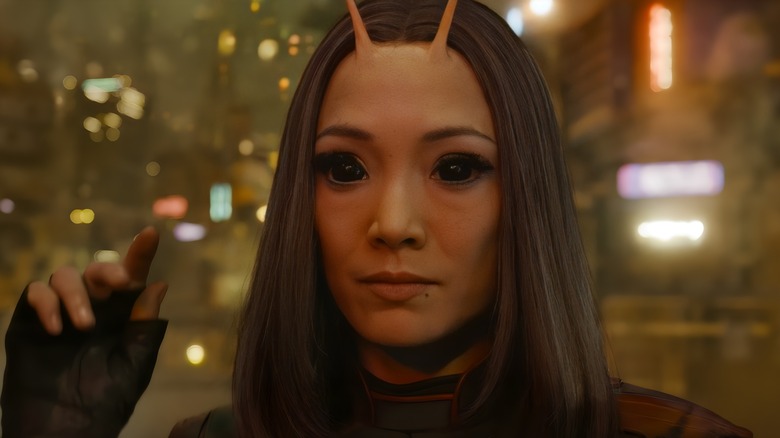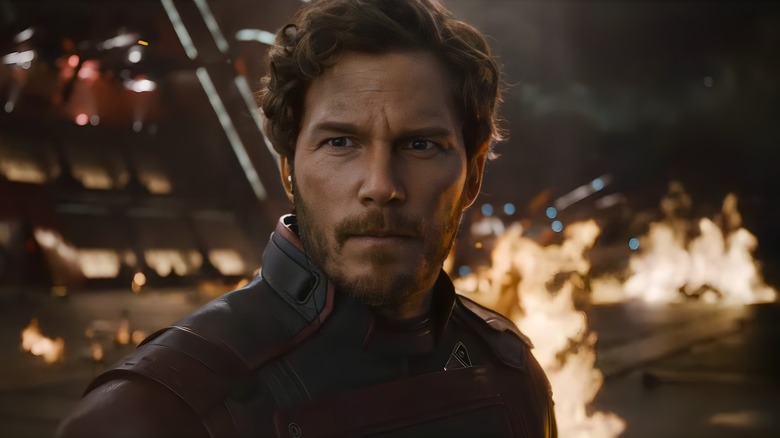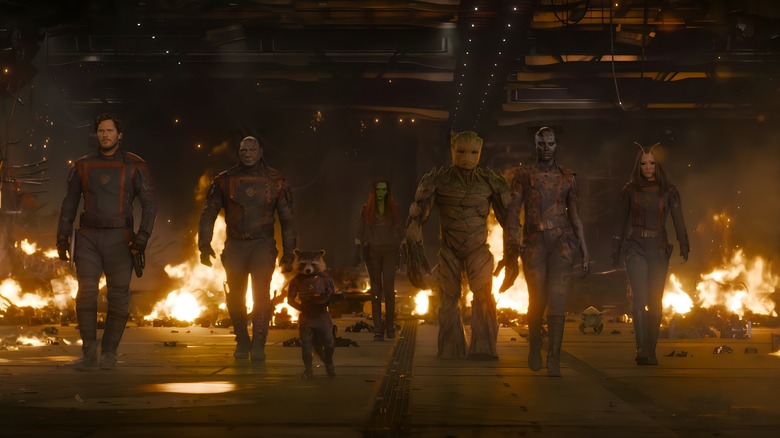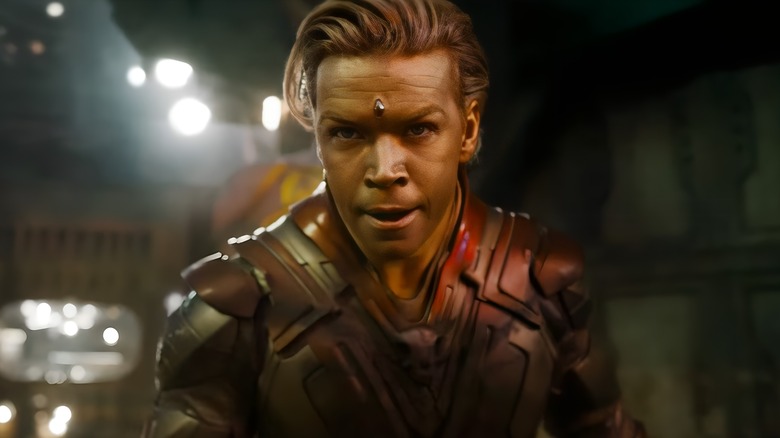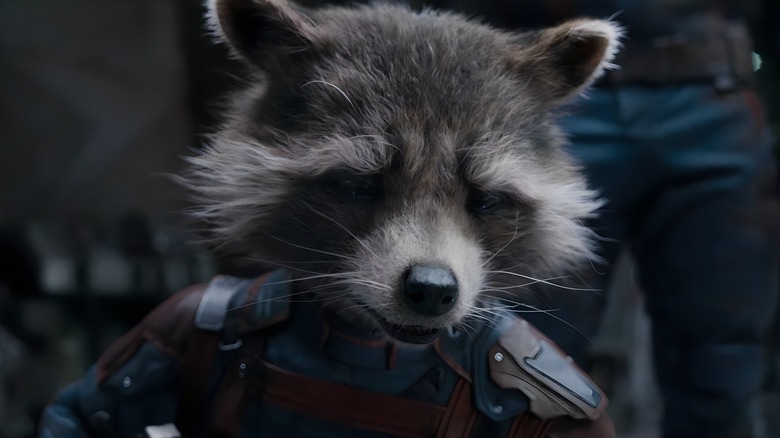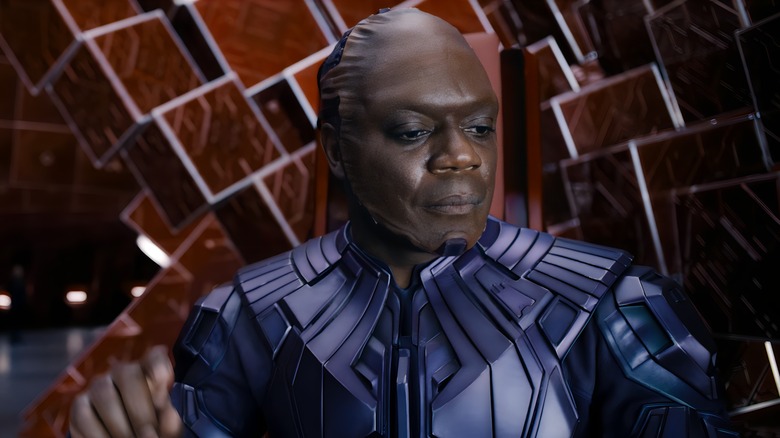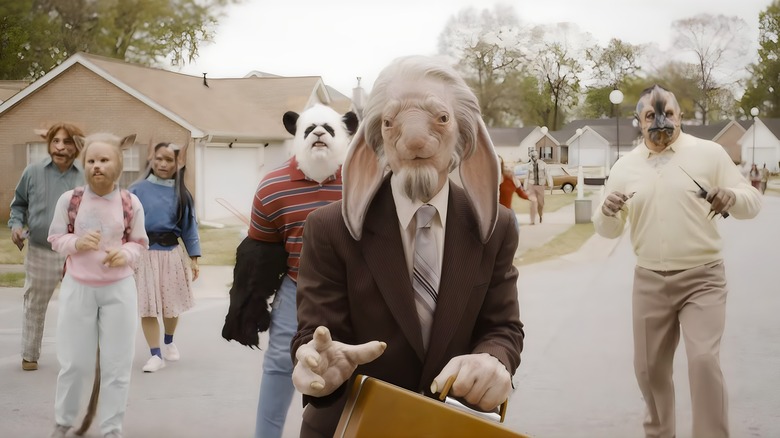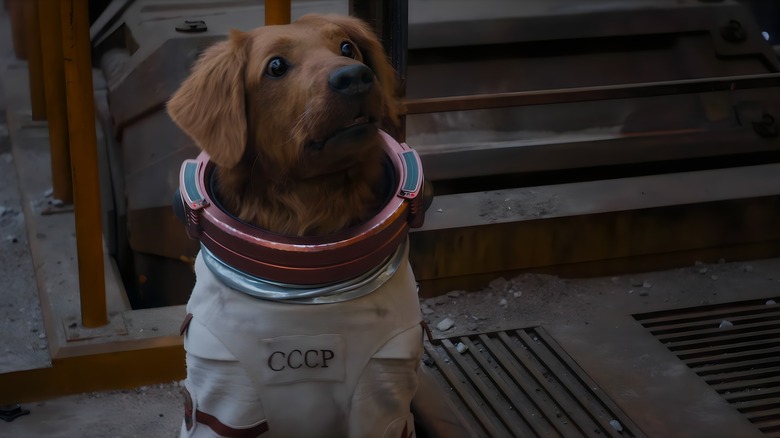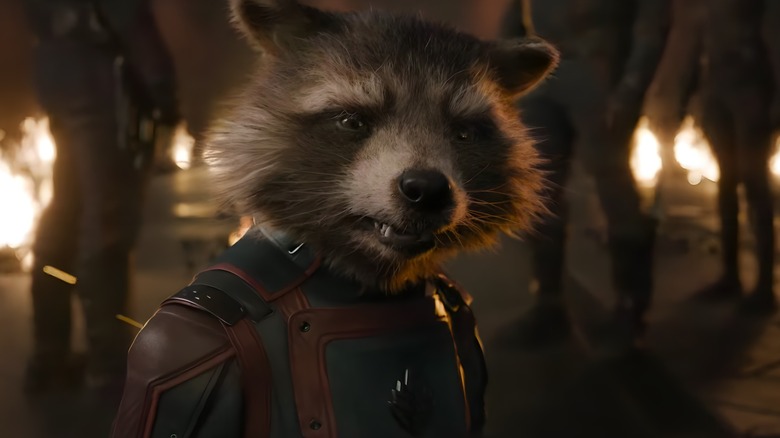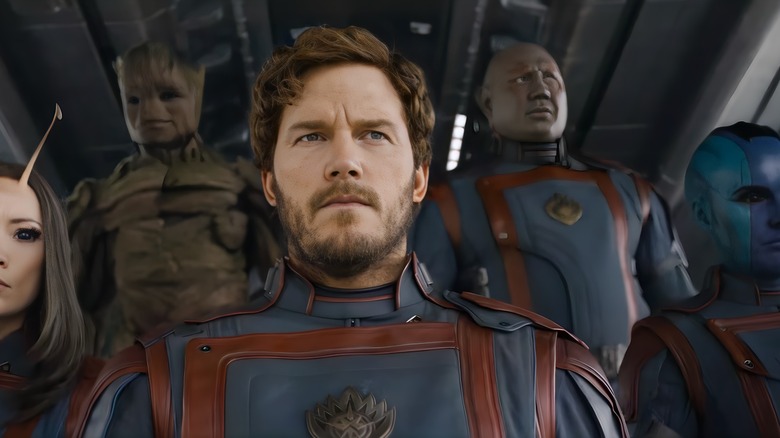The Ending Of Guardians Of The Galaxy Vol. 3 Explained
Warning: This article contains spoilers for "Guardians of the Galaxy Vol. 3"
"This story has been yours all along. You just didn't know it." That line, spoken midway through "Guardians of the Galaxy Vol. 3," could easily be meant for the entire series. In many ways, James Gunn's sci-fi adventures have been the heart and soul of the Marvel Cinematic Universe, and the third film is the most satisfying climax the franchise has had in years.
That's not to say that it's climactic in an "Avengers" way. Quite the contrary, "Vol. 3" is much more interested in wrapping up character arcs than in addressing some multiverse-level threat. There are plenty of big action sequences, and the villains are extremely evil, but the emotional stakes supersede the cosmic ones at every turn. Whether or not this ends up being the last "Guardians of the Galaxy" film, it feels definitely like the end of an era, as many of its stars have alluded to.
The MCU has had plenty of great moments over the years, but the character growth seen by the end of "Vol. 3" is a cut above. The series' massive ensemble of characters truly feels like a family at this point, and the film's final act shows just how much they've all changed for the better. So let's dive into the ending of "Guardians of the Galaxy Vol. 3," its deeper themes, and what it means for the characters.
No one left behind
Most of "Guardians of the Galaxy Vol. 3" is spent trying to save Rocket (Bradley Cooper). The movie opens with a brutal attack by Adam Warlock (Will Poulter) on Knowhere, which has become a thriving base of operations for the Guardians since they bought it in their Disney+ holiday special. Rocket is grievously injured in the assault. Saving him means going after the High Evolutionary (Chukwudi Iwuji) — a deranged bioengineer obsessed with creating "the perfect species and the perfect society." He's also the man who made Rocket what he is, making the whole mission more complicated.
By the final act, Rocket's resuscitated, but his creator still seeks vengeance. What follows is a massive space battle between Knowhere and the Evolutionary's massive flagship, wherein the Guardians attempt to save the many innocent beings imprisoned by the villain. The battle looks very cool — especially the corridor fight where the reunited team takes down a whole platoon of the High Evolutionary's soldiers.
What makes this climax really hit home, though, is the characters' willingness to sacrifice. They spend the whole film trying to revive Rocket, only for Nebula (Karen Gillan), Drax (Dave Bautista), and Mantis (Pom Klementieff) to get captured in the process. So Rocket, Star-Lord (Chris Pratt), and Gamora (Zoe Saldana) go back for them, the children the Evolutionary holds captive, and every other lifeform on his ship. "Vol. 3" is a movie where saving lives, not killing the villain, is the goal. The ending resonates much more strongly for that reason.
Rocket faces his past
For Rocket, fighting through the High Evolutionary's flagship means returning to the place of his creation. We get his full backstory in bits and pieces throughout the movie: his horrific, caged existence as a baby raccoon, his brutal transformation into a humanoid hybrid, and his eventual escape. We also see how his three closest friends in captivity all died as they tried to flee.
You'd think that going back would be a tough ask for Rocket, but he does it without fear or hesitation. "I'm done running," he declares to the rest of the team at one point. Then he leads the charge into the belly of the beast. Eventually, he works his way to the very room where he and his friends were once caged. The cells are packed with more innocent animal specimens, and Rocket sets them all free.
His encounter with the cage of baby raccoons is particularly powerful. Desperate to give them the chance he never had, he struggles to fit every single one on his body and carry them to safety. Rocket even acknowledges himself as a raccoon in this scene after reading the label on the cage. Having faced his demons and conquered them, he's finally able to take ownership of who he truly is, free of anyone else's control. At last, just like the animals he liberates, he's free.
Building a new society
"Guardians of the Galaxy Vol. 3" is all about creation. It's the thing the High Evolutionary is obsessed with — building a species that's perfect; a society that's perfect. But his ambitions are so thoroughly corrupted that all his efforts turn out wrong. "You didn't want to make things perfect," Rocket tells him at the end of the movie. "You just hated things the way they were."
After defeating the villain, the Guardians take a different approach to creation. Knowhere more than doubles in population size thanks to all the freed lifeforms, and Nebula dedicates herself to building a "new society" for them. She uses the same words as the High Evolutionary, yet the society she refers to couldn't be more different. Where the villain used eugenics to eradicate any traits he deemed unsuitable, Knowhere welcomes all kinds of people, however they are, and becomes a home for them.
It's powerful to see Nebula so dedicated to creating something good. For years, rage was her only motivator, and violence her only tool. Now, she genuinely wants to be the one in charge — the person responsible for building a better world and protecting those in it. Fortunately, she'll have Drax by her side while she does it. After insulting him mercilessly for most of the movie, she acknowledges his pure heart and asks for his help with the children. "You weren't born to be a destroyer," she says tearfully. "You were born to be a dad."
Not the Gamora you're looking for
Gamora is dead; long live Gamora. For most of the movie, Peter Quill tries desperately to bring the new (or old, depending on how you view the "Guardians of the Galaxy" timeline) Gamora back to who she used to be (or never was ... again, it's confusing). But by the end of "Vol. 3," she's still not there. And she may never be.
Gamora certainly has an arc in the movie. At the start, she's a cold-hearted loner with negative interest in rebuilding friendships with any of the Guardians. But she eventually starts to soften and seems to enjoy being around them. She can even understand Groot again when all is said and done.
However, she doesn't actually rejoin the family. There's a telling shot after the High Evolutionary is defeated when the Guardians and a bunch of Knowhere residents pile in for a massive group hug. Gamora watches from a distance, smiling, but unwilling to join in herself. Instead, she decides to return to the Ravagers, where she seems to genuinely belong. As she tells Quill, she's simply not the person he used to know, and it's unlikely that she will ever be.
There's still a moment of hesitation before she leaves Peter for good. Looking away from him, both tearing up, she says simply, "I bet we were fun." It's an acknowledgment that she both wishes she could be that person again and that she can't. She can only be the Gamora she is now.
Mantis sets off on her own
Having only joined the franchise in "Guardians of the Galaxy Vol. 2," Mantis has always felt a bit like a secondary protagonist. "Vol. 3" fixes that by giving her as much material as anyone else in the movie (save for Rocket), and it acknowledges her own unique role by sending her off on some solo adventures at the end of the film.
The High Evolutionary is defeated, Knowhere is saved, and the Guardians all choose different paths for the immediate future. For Mantis, that means following her own compass for once, rather than Ego's, or her team's, or anyone else's. What does that mean exactly? Maybe setting up her own private practice where she helps people process their emotions. Maybe a long, relaxing, well-earned vacation at the cushiest resort in the galaxy. Or maybe she'll continue her superhero work, just outside the purview of the other Guardians.
Whatever Mantis's next chapter brings, it could slot her back into the MCU at a later point. For now, though, she's clearly focused on herself, which is only healthy.
Star-Lord goes home
Both of Ego's children in the Guardians take some solo time at the end of "Vol. 3." Mantis goes off to focus on her own desires and priorities, and Star-Lord finally ventures home to Earth. "My mother died in front of me when I was eight years old and I've been running ever since," he tells the rest of the crew. So in the interest of no longer running, he goes to see if his grandfather is still alive. Lo and behold, he is.
Peter Quill's reunion with his aging grandpa is a touching moment. It's sweet to see the family back together at last, but it also symbolizes a major step in Peter's larger arc. What he says to his team is right — he has been running his whole life. Whether that's from his own problems, enemy Ravagers, the law, or Thanos, he's always managed to find some crisis to keep him busy and his mind off more personal matters. His willingness to face his past at all — to cast off the markers of Star-Lord and just become Pete for a while — is commendable. It shows just how far he's come over the course of the trilogy and the MCU as a whole.
At the end of the day, the "Guardians of the Galaxy" films are about accepting the bad things that have happened to you and finding new sources of joy in spite of them. That process is never easy, but Peter's finally on the right path.
We are Groot
"I am Groot." It's perhaps the most famous line in all of the MCU, strictly on the merits of how frequently it's been said. When a major character can only say one thing, it's bound to pop up a lot. But at the end of "Guardians of the Galaxy Vol. 3," something strange happens. In their final meeting before going their separate ways, the Guardians hug it out, and Groot says something different: "I love you guys."
If you got confused while watching this scene, that's more than fair. After all, the other characters don't even react. But that's because Groot doesn't actually say anything differently. All of us can just understand it now.
James Gunn explained to Digital Spy in 2020 how Groot's language actually works. "People don't learn Groot through knowing the language," the director said. "They learn it through connecting with Groot." The film demonstrates this just moments before the big line, in a scene between the big guy and Gamora. He approaches her alone to tell her it was good to work with her again, and she's surprised to discover that she understands him. By helping to save Rocket and defeat the High Evolutionary, she's reconnected with Groot enough to speak with him — and so have we.
This is a true fourth-wall-breaking moment. Because we've all followed the Guardians on their many adventures, we too can finally understand Groot. We're all, the film seems to say, part of the family.
Everyone deserves a second chance
Redemption is one of the big themes of "Guardians of the Galaxy Vol. 3." In the final act, Adam Warlock (Will Poulter) is baffled after Groot saves him from certain death. His confusion is understandable. After all, he spends the whole movie trying to kill the Guardians. But Groot gives a simple answer, and Drax translates: "Everyone deserves a second chance."
Adam quickly justifies his reprieve by saving Star-Lord from the cold vacuum of space. However, he's far from the only character in the movie to benefit from a second chance. Nebula has arguably the most significant arc through the whole "Guardians" series, with the end of "Vol. 3" seeing her heading up a new, healthy, positive society. It's a far cry from the violent villain she is in the first film, and it shows just far a little compassion and kindness can go. Peter gives his grandfather a second chance after a rocky childhood, and it ends up being the right decision.
Heck, Groot is a walking, groaning metaphor for second chances. After being killed in the first movie, he goes on a long journey of regrowth. By the end of "Guardians of the Galaxy Vol. 3," he's bigger and stronger than he ever was before.
A story about rebuilding
"Guardians of the Galaxy" has always been about healing — about how trauma changes us, but also how we can grow past it. "Vol. 3" takes that theme to its natural conclusion by telling a story all about rebuilding. The film opens with a Rocket flashback, followed by a long-take tour of Knowhere, where construction is ubiquitous. Under Nebula's guiding hand, the citizens of the cosmic community are building something together. After Adam Warlock comes in and smashes half of Knowhere to bits, they start rebuilding.
Peter rebuilds his life after the death of Gamora. Rocket rebuilds his after a lifetime of abuse. Even Drax finds a kind of surrogate family by becoming an adoptive father to the many child prisoners of the High Evolutionary. From every angle, "Guardians of the Galaxy Vol. 3" shows that tragedy leaves scars, but that healing and rebuilding are always possible. Two things can be true: Grief may never fully leave you, and hope is still possible. The characters in "Guardians" are broken people at the start, hurt by loneliness, torture, and loss. But by the end of "Vol. 3," they've made a home for themselves and others like them where all are welcome.
This all stands in stark contrast to the High Evolutionary, who would rather demolish an entire planet he created and start over than attempt to fix things. His view that flaws are to be incinerated, not treated, is the reason he becomes so corrupt.
A perfectly imperfect world
Perfection. That's what the High Evolutionary claims to be pursuing. For the good of the galaxy, he says, he must create, destroy, and torment countless lives, all to make something perfect. But of course, there's no such thing as a perfect species, or a perfect world, or a perfect person.
Everything in "Guardians of the Galaxy" is broken, but that's what makes it beautiful. Rocket suffered horribly at the hands of the High Evolutionary and lost close friends, but still manages to find a new family for himself, just like Peter, Drax, and the others do. Gamora is a walking ghost in "Vol. 3" — a woman whose life was stolen from her and who's forced to pick up the pieces from an earlier save point. Yet she finds a new path that still gives her meaning.
Nebula is perhaps the clearest example of this theme, as her body was literally broken time and again by her father. But now, she uses those modifications to help others. It's only fitting, then, that the Guardians build their home on Knowhere — the severed head of an ancient being that's been attacked and reconstructed numerous times. Then there's Rocket himself, who finds the flaw in his creator's bioengineering scheme despite being, by all accounts, a run-of-the-mill experiment.
There is no such thing as a perfect world, but there is power and purpose in the imperfection. Where the High Evolutionary sees flaws in his creations, the citizens of Knowhere see valuable life.
All life is sacred
The superhero genre has gotten so expensive and complicated in recent years that it can be easy to forget its original appeal. Long before Easter eggs, crossovers, or comic book blockbusters, Superman and Batman saved innocent people. It didn't have to be from Lex Luthor, or the Joker, or Thanos. Sometimes it was just from a burning building, or a falling airplane, or a runaway train.
"Guardians of the Galaxy Vol. 3" gets back to that original superhero intention in its final act. It's not enough for the heroes to save just themselves, or the children imprisoned by the High Evolutionary. They have to rescue everyone — from the biggest Abilisk to the smallest baby raccoon. It seems like an obvious beat for a Marvel movie, and yet it feels surprisingly fresh. Instead of putting the climactic focus on beating the bad guy, James Gunn rests it squarely on the saving of lives. The scene where all the animals escape is honestly pretty emotional, as well as hilarious and oddly biblical (like a couple of other moments).
At his lowest point, when he's talking to Lylla (Linda Cardellini) in what might be heaven (again, oddly biblical), Rocket gives voice to the grief of their existence. "They made us for nothing," he says, crying. It's true, but also very wrong. The message of "Guardians of the Galaxy Vol. 3" seems to be that all life, regardless of creation, intention, or language, is sacred.
The dog days are over
As is only appropriate for the third film in the series, "Guardians of the Galaxy Vol. 3" ends with an extended dance scene set to a famous pop song. But thanks to the Zune passed down from Yondu to Star-Lord to Rocket, it's a lot more modern than most of the music in the franchise. Rocket hooks the audio up to speakers all around Knowhere and starts blasting Florence + the Machine's 2008 hit "Dog Days Are Over." It's the perfect choice.
The song provides a beautiful thematic wrap-up to the whole "Guardians" trilogy. It describes a woman so terrified of happiness that she runs and hides at every opportunity, trying to avoid it. The fear of losing that happiness is enough to make her flee from it. But in the end, she has to accept the joy; even though it makes her vulnerable to future hurt, avoiding happiness out of fear is no way to live. All of the Guardians have been running from things since we met them: personal losses, regrets, traumatic childhoods, you name it. They're all scared to trust again because it could mean more betrayal down the line. Fortunately, they convince one another to step back into the space of hope.
Everyone in Knowhere dances wildly to the song, letting the good energy that's been so long overdue fire out through their limbs. Even Drax, who starts the film by declaring that "only idiots dance," can't help himself.
The new Guardians of the Galaxy
The mid-credits scene in "Guardians of the Galaxy Vol. 3" shows us the fate of the team after its many notable departures. Rocket is now leading the team, made up of Groot, Kraglin (Sean Gunn), Cosmo the Spacedog (Maria Bakalova), Adam Warlock, and a young girl rescued from the High Evolutionary named Phyla (Kai Zen), who could be the comics' Phyla-Vell.
We catch up with the updated troupe as they save the local populace from a herd of deadly monsters on a desert planet. Kraglin has fully mastered Yondu's Yaka Arrow by this point, and Groot has grown to a truly gargantuan size. He looks more like a rock creature than a tree creature to be honest, and his strength has grown accordingly. The more important moment here isn't the battle, though, but the conversation that precedes it. As they all await the arrival of their foes, Rocket asks everyone what their current go-to song is. They all share, and when he's asked the same question in return, Rocket puts on Redbone's "Come and Get Your Love," which kicked off the first "Guardians" film.
It's a great choice, not just because it brings the trilogy full circle, but because it passes the legacy of being the Guardians captain from Star-Lord to Rocket. The scene also drives home just how much happier and healthier Rocket is now, having rediscovered and fully embraced his childhood love of music.
What's next for Star-Lord and the others?
The "Guardians of the Galaxy Vol. 3" post-credits scene shows Peter Quill eating a peaceful breakfast with his grandfather, who's reading the newspaper. They chat briefly, and when the scene fades to black, a message appears stating that Star-Lord will return to the MCU.
This is pretty big news, as all indications from James Gunn and the cast point to "Vol. 3" being the end of the story. It's significant that the stinger only mentions Star-Lord, rather than the whole team; the logical explanation is that Star-Lord will pop up on Earth in some future MCU project — possibly "Avengers: Secret Wars" or "Avengers: The Kang Dynasty." Disney would need to have Chris Pratt locked down already in order to make that commitment, and it's easy to imagine him helping out some of his fellow Earthlings down the line.
Does that mean that the other Guardians couldn't also return someday? Not necessarily. James Gunn is likely done with Marvel for the foreseeable future now that he's heading up DC Studios, but some of his characters could come back in cameos or crossovers. However, "Guardians of the Galaxy Vol. 3" feels like a pretty clear finale for this particular squad. It's the end of an era, and the first real trilogy Marvel Studios has completed in years. Every character gets to walk into the sunset in their own way, and the series might do well to leave them there for a while. Ending stories can be nice.
